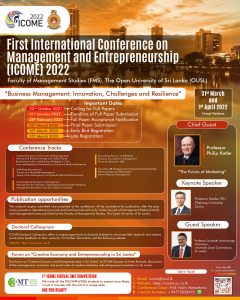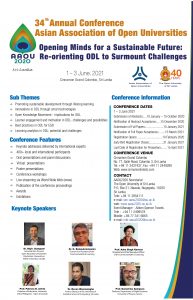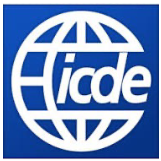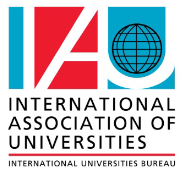1st Series
Topic: “Getting Published in High Impact Journals”
Som Naidu, Associate Professor (Learning Transformations), Swinburne University of Technology in Melbourne, Australia
Last Updated on 2 days
Topic: “Developing virtual Collaborative Learning Collaborative Harnessing the Power of Social Media”
Charlotte Nirmalani Gunawardena, Distinguished Professor, University of New Mexico, USA
Last Updated on 2 days
Topic: “Current Status of the Japanese Institutional Repository in Open Access Activity and its Further Collaboration with Sri Lanka”
Kazu Yamaji, Associate Professor, National Institute of Informatics, Japan
Last Updated on 2 days
Topic: “The Essentials of “MOOC” Phenomena: The Prospects for “After-MOOCs””
4. Tsuneo Yamada, Professor in Department of Informatics & Center for Open Distance Education, The Open University of Japan
Last Updated on 2 days
Topic: “Learner support: reflections on paradigms, models and pedagogical approaches for 21st century learners in Higher Education”
5. Godson Gatsha, Educational Specialist in Higher Education, Commonwealth of Learning, Canada
Link:https://www.youtube.com/watch?v=HFWahzMaAA&list=PLkgf3F2zyuJQCu0x0cThF7535r3Y6FpS1&index=10
Last Updated on 2 days
Topic: “Making the University Relevant”
6. Professor Rohan Samarajiva, Founding Chair, LIRNEasia
Last Updated on 2 days
Topic: “Distance Education and its relevance to job market”
7. Naveed A. Malik, Founder Rector, Virtual University of Pakistan
Last Updated on 2 days
Topic: “The Best Way to Predict the Future is to Invent It”
8. Kathryn Chang Barker, Consulting Education Futurist and Strategist & Higher Education Expert Consultant at Ministry of Education and Higher Education (MEHE), State of Qatar
Last Updated on 2 days
2nd Series
Topic: “Point-of-Care Devices for Diagnosing Infectious Diseases”
1. Wamadeva Balachandran, Research Professor, Brunel University London, UK
Last Updated on 2 days
Topic: “Taming Knowledge Explosion through Conceptual Teaching and Learning”
2. Nancy Ridenour, Dr. Jenny Vacek & Dr. Judy Liesveld, University of New Mexico, USA
Last Updated on 2 days
3rd Series
Topic: “The meeting of so many nationalities with such earnestness of purpose”
1. Emerita Margaret Allen, Professor in gender studies, University of Adelaide, South Australia.
Last Updated on 2 days
Topic: “The Futures of Distance Education”
2. Ormond Simpson, Visiting fellow, London University
Last Updated on 2 days
Topic: “Meeting of the minds: A psychological perspective on culture and international education”
3. Brian Haas PhD, Assistant Professor of psychology, University of Georgia, USA.
Last Updated on 2 days
Topic: “Quality Assurance and Sustenance in Higher Education Institutions (HEIs): an overview”
4. Srinivasa Rasgavan, Professor, Head of the Department of Library and Information Science and the chair of the School of Library & Information Science, Bharathidasan University, India
Last Updated on 2 days
4th Series
Topic: “Microbiome, the future of Medicine”
1. Janaki Lelwala Guruge, Senior Research Scientist, Center of Genome Science and Systems Biology, Washington University School of medicine, USA.
Last Updated on 2 days
Topic: “Mainstreaming Disaster Education and Research in Open and Distance Learning” (8th February 2018)
2. Khondoker Mokaddem Hossain, PhD –
Link:
Last Updated on 2 days
Topic: “Ethics in Psychology: Global and Sri Lankan contexts”
3. Jeanne Marecek, Senior Research Professor in psychology, Swarthmore College, USA
Link: https://www.youtube.com/watch?v=lNCcR3GreA&list=PLkgf3F2zyuJQCu0x0cThF7535r3Y6FpS1&index=16
Last Updated on 2 days
Topic: “The Philosophy and Practices that are Revolutionizing Education and Science”
4. Rajiv Jhangiani, Special Advisor of the Provost on Open Education, Kwantlen Polytechnic University
Last Updated on 2 days
5th Series
Topic: “Latest Trends in High Rise Building Design & Construction”
1. Priyan Mendis, Senior professor of infrastructure Engineering in University of Melbourne, Australia, Leader of Advance Protective Engineering Structure, Director of Australian Research Council
Last Updated on 2 days
Topic: “Use of Learning Analytics in ODL”
2. Bart Rienties, Professor of Learning Analytics, The Open University, UK
Last Updated on 2 days
Topic: “Trends in Open, Distance, and Online Learning in Indonesia – with a specific reference to University Terbuka”
3. Aminudin Zuhairi, Senior Lecturer of Open and Distance Education, University of Terbuka, Indonesia
Last Updated on 2 days
Topic: “An Overview of MOOCs in India”
4. Jeetendra Pande, Assistant Director-Research, Assistant Professor- Computer Science Department, Utkan open University, India
Last Updated on 2 days
6th Series
Topic: “Affordable Health Care Solutions for Developing Countries: Design & Development of Biomaterials for Tissue Engineering” (22nd January 2020)
1. Muhammad Yar
Link:
Last Updated on 2 days
Public Lectures by Vising Fellows
Topic: “Learner Support Services”
1. Saumya, Assistant Professor at School of Social Work, Indira Gandhi National Open University (IGNOU), India
Last Updated on 2 days
Topic: “Quest for functional strategies in online teaching: policy approach”
2. Md. Fakhrul Islam Patwary, Assistant Professor at School of Social Science, Bangladesh Open University
Last Updated on 2 days
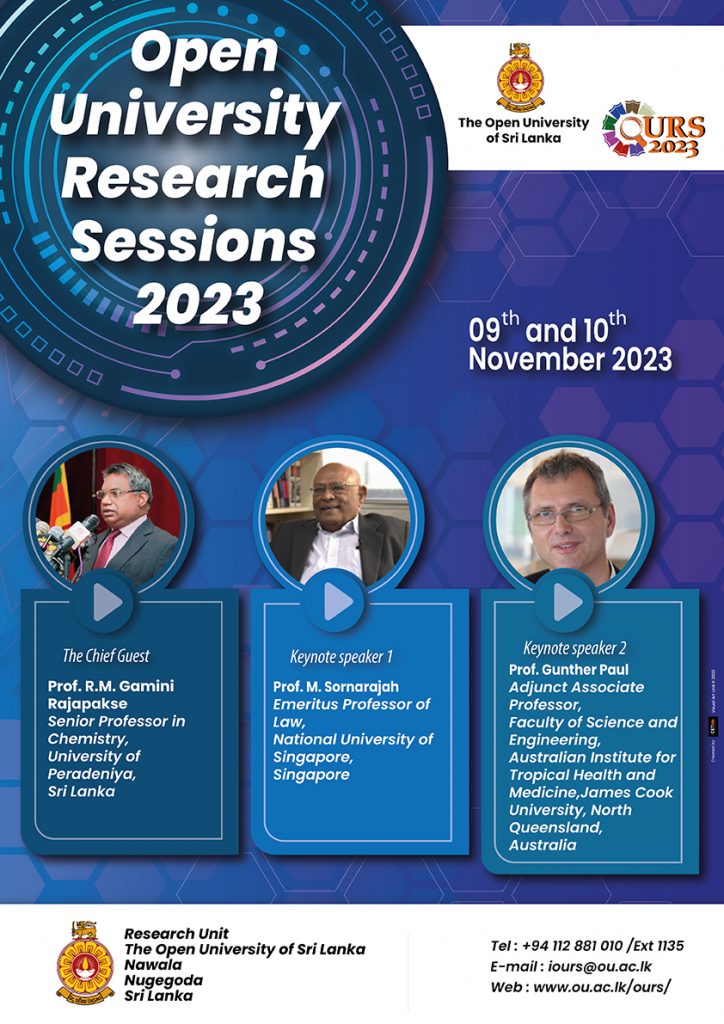
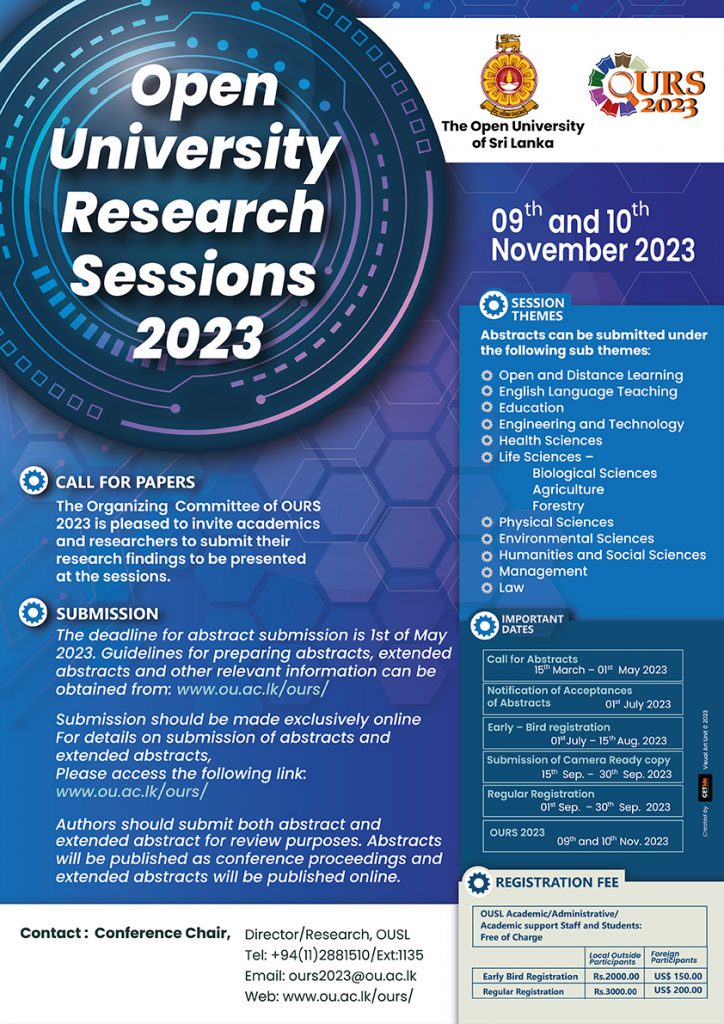
__________________________________________________________________________________________________
Diplomatic Skills Programme for Academics at BIDTI
The IRU and Staff Development Centre (SDC) of the OUSL together with the Bandaranaike International Diplomatic Training Institute (BIDTI) joined hands to organize an exclusive 2-day workshop on “Diplomatic Skills Programme for Academics” which was held on the 6th & 7th June at BIDTI. Programme objectives were that academics develop their capacity to deal with foreign counterparts in a manner productive for the personal and institutional development. They become more conversant of international protocols relevant to their field and become outstanding performers in international events.
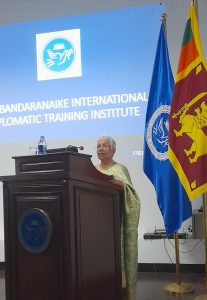
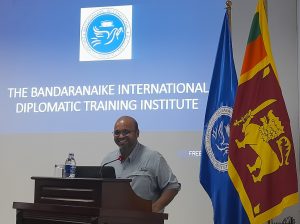
Ms. Pamela Dean, Dr. Prasad Senadheera,
Director General of the BIDTI welcoming the audience Director of International Relations, OUSL addressing the audience
An array of subjects which included an Introduction to Diplomacy, Diplomatic protocol, Etiquette & Correspondence, Communicating Skills, Negotiating Skills (both bilateral and multilateral), Organizing and attending international conferences and Techniques in developing partnership were covered. These topics were presented by highly skillful and dynamic resource persons with years of experience within the field. They were able to share their knowledge gained at first hand, while catering to the needs and occasions befitting that of an academic.
Nominees representing the Faculties of OUSL, CETMe, and academics invited from the Universities of Kelaniya, Moratuwa, Sri Jayawardenepura and Wayamba University of Sri Lanka were among the participants of this event. Without doubt, the insight gained through the participation of this workshop will be of fundamental importance for all the participants engaging in and forging partnerships with overseas individuals or institutes, and especially in organizing international events, including conferences.
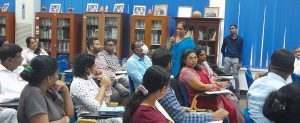
At the end of the 2-day workshop, all participants were awarded a certificate by Ms. Pamela J. Dean, the Director General of BIDTI. The IRU is hopeful of continuing their partnership with the BIDTI in conducting this programme again, in the future.
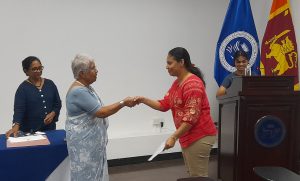
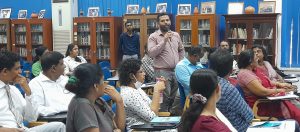
__________________________________________________________________________________________________
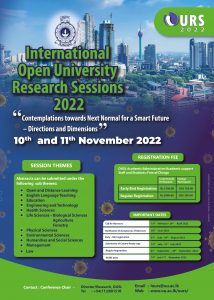
OUSL is a member of the Asian Association of Open Universities and in 2020 and we will host the 34th Annual Conference of Asian Association of Open Universities in 2021.
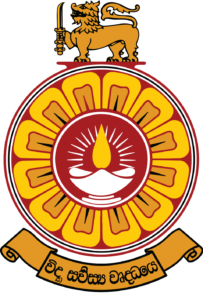
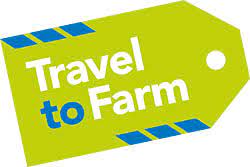
TRAVEL TO FARM PROGRAM INFORMATION 2023
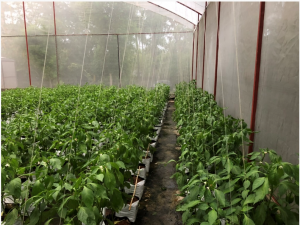
Travel to Farm (https://t2f.dk/trainee-in-dk/) is a non-profit organization specializing in agricultural exchange. They offer a “learning by doing” program on Danish farms and the opportunity to get more practical experience in the green sector. Working “hands on” in the agricultural and horticultural sector gives the participant an opportunity to learn more about new technologies and management within the desired field. Travel to Farm offers training periods between 4-12 months which gives the opportunity to gain valuable practical experience to complement their education.
Types of placements available
♦ Crop Farm
♦ Vegetables and Plant Nursery
♦ Floriculture Farm
♦ Dairy Farm
Trainee requirements
Age: Marital status: | 19-29 years old Unmarried |
Education: | Student from an agricultural college, technical school of agricultural/horticultural university |
Practical experience: | Proven experience of practical farm work in the requested type of placement. |
Driving license: | Preferably for car/ tractor – (tractor driving license is mandatory for crop farm placements). |
Language: | Good spoken English and have passed an English IELTS or Cambridge test level A2 or speak German proficiently (We will also conduct an interview with the applicant before accepting him/her for the program). |
Duration: | 9-12 months - depending on type of placement. General working hours will be 37 hours per week. Trainees will receive 2½ days holiday per month. |
Wages and tax: | Trainees will be paid a monthly salary of DKK 11,571 (before taxes). Salary will be increased after the first 6 months of employment. The cost for lodging will be DKK 2,000-2500 per month. Payment for extra working hours ranges from 100-130 per additional hour. Read the section below on “Programme price -Salary” for more details. |
Insurance: | Every intern must pay DKK 103/month (approximately DKK 1,100 per year) as insurance fees. |
Application: | Minimum 4 months before the date of arrival in Denmark. |
Visa: | Long stay, Work visa |
Things you need to know:
Application process
You can apply online (please scroll down to see link). Screened applicants will then be called for an interview. Once selected, Travel to Farm will look for a suitable host to match your qualifications.
Arrival in Denmark
After your arrival in Denmark, Travel to Farm will provide you with additional information regarding contracts, tax payments, cultural adjustments etc. After this meeting the trainee will travel by train to meet the host. The trainee must pay for this ticket.
Probation period
The first month is the probation period. During this time, the trainee or host can cancel the employment agreement giving two weeks’ notice. After this probation period, the contract can be cancelled on both sides with one month’s notice, to end on the last day of the following month.
During the programme
If you have problems during your stay, Travel to Farm is always available to help. Apart from the contact with Travel to Farm, which will continue unchanged, the trainee traveling to Denmark will have a contact person at the regional office of the Young Farmer’s Clubs, with whom they shall meet and can contact in case of an emergency. If, for instance, the working conditions at the placement is not in order, a farm youth advisor will visit this placement and examine what needs to be changed.
Every June, Travel to Farm also arranges a study tour for all the trainees. You can refer their website for more details on this.
Programme price
Residence permit to work in Denmark:
Once you have been selected for the Travel to Farm programme, an application will be made at The Danish Agency for International Recruitment and Integration (SIRI) New to Denmark (nyidanmark.dk) for a new residence card and you will receive your Case Order ID. Thereafter a payment fee of DKK 4,320 must be made.
This payment can be made online using your credit/debit card or through Travel to Farm.
In the case of payment through Travel to Farm, an added fee (of about DKK 68) will be charged to cover the costs of the administrative work.
Visa application:
This is done by obtaining an appointment online through the VFS Global Website (Welcome to VFS Global | For Individuals | Home). For Sri Lankan applicants, they should submit their applications through the Norway Visa Application Center in Colombo – VFS Global office (as all visa applications for Denmark are now handled by the Norwegian Embassy). The application will be screened at the Norwegian Embassy in New Delhi and forwarded to the Directorate of Immigration (UDI) in Norway for further processing.
Type of visa application: Residence permit for work Fee: NOK 6,300
Insurance and Other Fees:
The Travel to Farm administration fee for the year 2023, for all types of placements is DKK 5,000. This amount will be deducted from the intern’s first two month’s salary in Denmark.
In addition, you will pay an amount of DKK 103/month (approximately DKK 1,100 per year) as insurance fees
Salary:
The monthly salary before taxes is DKK 11,571.
Payment for extra working hours during peak seasons is DKK 108.26 per hour for the first two hours per day and DKK 129.91 per additional hour.
The host farm will provide a room for the trainee, including heat, electricity, water, bed sheets and towels. The price for this room is fixed at DKK 2,000/month, which is deducted from the salary.
The trainee will also have to pay for transportation from Travel to Farm office to the host farm.
In Denmark, the tax deduction is approximately 39%. Each month you get about approx. DKK 6,400 in net cash payment after tax has been deducted. The exact amount depends on specific tax agreements between Denmark and the intern’s home country and could change from one year to another.
*Please note that the salary is regulated every year the 1st of March.
The normal working time is 37 hours per week.
Work exceeding this is paid by free time 1:1 or in cash with a minimum of 107 DKK/hr before tax, which of these is decided by the host farmer. Trainees from overseas are not allowed to have planned overtime. They are, however, allowed to work overtime during peak season. The trainee has a minimum of 5 weeks’ holiday per year (2.5 days/month) + an additional 6 days per year.
About working in Denmark:
All host farms are approved by the regional young farmer’s club, who have visited the farm to confirm that work and living conditions live up to our standards.
During peak seasons such as sowing and harvest, there usually will be extra work. As a rule, you will get extra time off in compensation for any hours exceeding 37 hours a week. The host farmer can choose to pay extra for overtime work instead of giving you extra time off.
Trainees work alongside the host farmer and possible Danish workers. No student should work longer hours than the farmer himself. Trainees who want to work with animals must be prepared to work on Saturdays and Sundays. All trainees must be prepared to work on Saturdays and possibly Sundays during peak seasons.
Application and Selection process
For the interview you will need to bring:
♦ A letter specifying which placement you wish to obtain and why
♦ Copy of passport
♦ Copy of driver’s license (if relevant)
♦ Two letters of references obtained within the past 3 months
Application deadline: 17th September 2023
If you have any question please don’t hesitate to contact ird@ou.ac.lk
WE LOOK FORWARD TO WELCOMING THE 2nd BATCH OF TRAINEES TO DENMARK
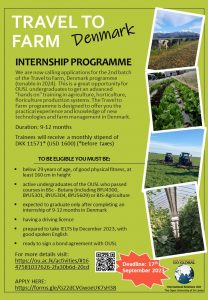 ____________________________________________________________________________________________________________
____________________________________________________________________________________________________________
Visit to Aigrow for Travel to Farm (T2F) students
The selected OUSL students who will take part in the Travel to Farm (T2F) – Denmark programme had the opportunity to visit a high-tech greenhouse for a half-day training which was facilitated by Aigrow (Pvt.) Ltd., TRACE Expert City, Colombo 10. This programme was coordinated by IRU and the students were accompanied by Dr. Buddhika Aruggoda, Senior Lecturer at the Department of Agricultural and Plantation Engineering, Faculty of Engineering Technology and the Director and staff of IRU.
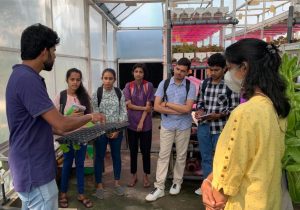 The objective of this training was to prepare the students for the T2F internship programme in the field of horticulture / floriculture, in Denmark. Here the students received ideas, expertise and experience which were readily shared by the Aigrow team. This visit enabled the students to observe and learn about special instruments, as well as the processes behind maintaining a greenhouse and growth conditions for certain crops.
The objective of this training was to prepare the students for the T2F internship programme in the field of horticulture / floriculture, in Denmark. Here the students received ideas, expertise and experience which were readily shared by the Aigrow team. This visit enabled the students to observe and learn about special instruments, as well as the processes behind maintaining a greenhouse and growth conditions for certain crops.
This visit would be valuable for the students to gain insight into working in high-tech environments, once they engage in their internship, as well as on how to apply their knowledge in the industry.
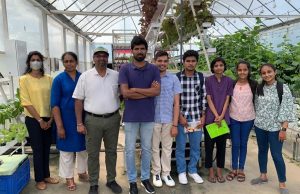
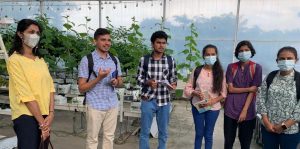
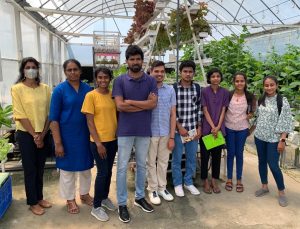
Last Updated on 2 days



